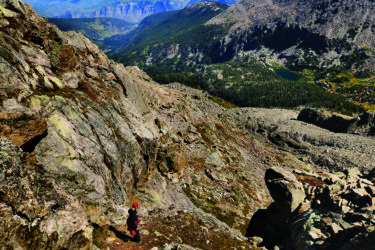The Local newsletter is your free, daily guide to life in Colorado. For locals, by locals.
When Phil Bouchard moved to the Front Range in 2020, he expected to discover the same kind of mountain-bike-dedicated infrastructure he’d grown up with in New Hampshire. Instead, he found crowds. The majority of trails on the Front Range are multiuse, meaning cyclists, hikers, trail runners, and sometimes even horses must share limited space. The cramped quarters often lead to increased tension and, worse yet, less fun for everyone.
So, a few months after his move, Bouchard and his business partner, Jason Evans, a childhood friend and fellow Centennial State transplant, decided to create a solution: They would develop the first mountain bike park on the Front Range. Bouchard and Evans even have the land picked out for the project, tentatively named Shadow Mountain Bike Park: a 250-acre parcel in Conifer. The pair created a plan that calls for erecting a single chairlift that would provide access to around 16 miles of trails that progress in difficulty. “Give mountain bikers a place where they can ride that’s designed for it,” Bouchard says, “and you’ll start to relieve much of that pressure on public trail systems.”
But, by attempting to fix one Front Range overcrowding issue, the duo inadvertently landed themselves in the middle of another. Locals opposed to the project have formed an organization called Stop Full Send Bike Ranch (Full Send was an earlier name for the park) to prevent what they say is unwelcome development. “I think that it’s important to note [that] this is really not a NIMBY [not in my backyard] issue,” says Raena Chatwin, the group’s co-chair. “This is really about…the negative impact this is going to have on the community.” Stop Full Send’s concerns are wide-ranging, from increased traffic and a strain on emergency services to a greater chance of wildfire and stress on wildlife.
Even if the bike park doesn’t move in, something will. The parcel of land Bouchard and Evans hope to lease is owned by the Colorado State Land Board, which rents out its 2.8 million acres of surface land to farmers, oil and gas companies, and other entities for the express purpose of raising money for Colorado’s public schools. (Since 2008, the Land Board has generated $2 billion.) Currently, the site is zoned by Jefferson County for agriculture, a wide-ranging category that includes anything from dairy farms to sewage treatment plants to campgrounds. “If you look at the alternatives,” Bouchard says, “it’s like, Whoa, is a bike park really the worst thing?”
To address concerns, Bouchard says Shadow Mountain will cap the number of vehicles at 300 per day, perform wildfire mitigation, hire on-site first-aid professionals, and close for around four months each winter when roads are at their worst. It isn’t enough for Chatwin. “I think, for the biggest concerns we have, there’s not much they can do to fix [them],” she says. Chatwin would prefer neighbors who better reflect the area’s pastoral environment, such as cattle.
Because the Land Board abides by local land-use regulations and rulings, Shadow Mountain’s next step is to gain approval from Jefferson County. Bouchard says they hope to submit their application as early as this month, at which point Stop Full Send will try to convince the county that the project is incompatible with the neighborhood’s character. If approved, construction on the new bike park could start this winter. If it isn’t? “I think, in one form or another, we’ll continue pursuing the project. I just don’t know exactly what that would look like,” Bouchard says. “But we are not planning for failure.”
Editor’s note: Shadow Mountain Bike Park co-owner Phil Bouchard is the brother of a former 5280 staff member and current freelancer.
(Read More: Black Hawk Announces Hard Money, the Front Range’s Newest Mountain Bike Trail)









